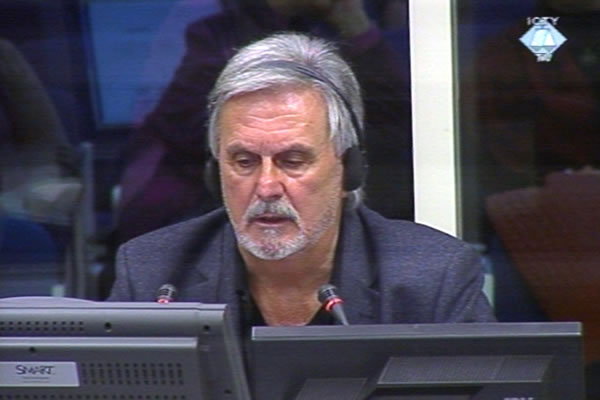Home
WHAT ARE THE ‘MOST PROFITABLE’ TARGETS?
In his evidence in Karadzic’s defense, Colonel Vladimir Radojcic provided his interpretation of an order issued to the Ilidza Brigade to open artillery fire on the ‘most profitable target in Hrasnica where it will inflict the greatest human casualties and physical destruction’. The witness claimed that the ‘military terminology’ used in the order meant ‘firing on personnel’ - soldiers
 Vladimir Radojčić, defence witness of Radovan Karadzic
Vladimir Radojčić, defence witness of Radovan Karadzic Through the evidence of Vladimir Radojcic, Karadzic is trying to prove that the Bosnian Serb army respected international humanitarian law and didn’t open fire on civilians. From January 1993 to the end of the war Radojcic was the commander of the 1st Ilidza Brigade. The indictment alleges that artillery and sniper fire was opened from the positions held by his brigade; this fire resulted in several incidents listed in the indictment.
In his statement to the defense, Radojcic claimed that he didn’t issue the order to open fire on a number of locations in the city. The indictment alleges that in 1994 and 1995, six children and two adults were killed and 17 persons were wounded at those locations. Radojcic contends that his brigade operated ‘defensively’ and fire was opened only on BH Army command posts or artillery positions in the city. Furthermore, Radojcic and his command ‘didn’t intend to cause civilian casualties or to exert psychological pressure’. He never received an order to attack civilians or public transport vehicles and he didn’t have ‘any intention or desire’ to make the lives of civilians more difficult. Radojcic also said he didn’t want to carry out any missions that were a ‘part of a systematic and indiscriminate attack on the civilian population’.
Radojcic had a standing order to ‘use ammunition as sparingly as possible’ and to fire only when necessary. According to Radojcic, he used modified air bombs only when there was no other ammunition available. Finally, Radojcic claimed that UNPROFOR convoys could pass freely through his brigade’s area of responsibility provided they complied with the conditions set previously.
In the cross-examination, prosecutor Carolyn Edgerton put it to the witness that the Serb forces hindered the movement of UNPROFOR staff, that ‘the roads and the airport’ were blocked and ‘humanitarian aid supplies by air was suspended’. Radojcic said ‘nobody informed me about that’ and that it may have been ‘done at a higher level’. Confronted with a SRK combat report on an artillery attack on an ‘unannounced convoy’, Radojcic said that in his view it was ‘a combined UN and Muslim forces’ convoy’. According to Radojcic, the Muslim forces were ‘perfidious’ and abused international organizations such as the Red Cross or UNHCR. The prosecutor told Radojcic that in this case, his brigade didn’t use precautionary measures to prevent civilian casualties. Radojcic was not informed about the movement of convoy and could not tell who was who from the distance of three kilometers, he said.
The prosecutor also showed an order issued by the Corps commander, Dragomir Milosevic, to the Ilidza Brigade, instructing them to fire a modified air bomb on the ‘most profitable target in Hrasnica where it will inflict the greatest human casualties and physical destruction’. The witness said the order was in line with the ‘military terminology’.‘Opening fire on personnel’ meant firing on soldiers. When the prosecutor noted that the order ‘doesn’t say personnel but human casualties’ the witness replied that he knew exactly what targets should be shelled. The witness also said that the BH Army command was under an obligation to remove civilians from combat zones. The prosecutor noted that the failure of one side to comply with international humanitarian law didn’t mean that the other side could be forgiven for doing the same. Radojcic will continue his evidence tomorrow.
Linked Reports
- Case : Karadzic
- 2012-12-07 ‘TYPICAL TERRORISM’ IN SARAJEVO
- 2012-12-06 DID BATKO HAVE POLITICAL BACKING?
- 2012-12-05 KARADZIC’S WITNESS: MUSLIMS LEFT PALE VOLUNTARILY
- 2012-12-12 WITNESSES DEFEND KARADZIC AND THEMSELVES
- 2012-12-13 WITNESS ORDERED HIS SOLDIERS TO USE BOMBS HE KNEW NOTHING ABOUT
- 2012-12-14 EXPLOSIVES EXPERT CONTESTS FINDINGS OF BALLISTICS EXPERT
